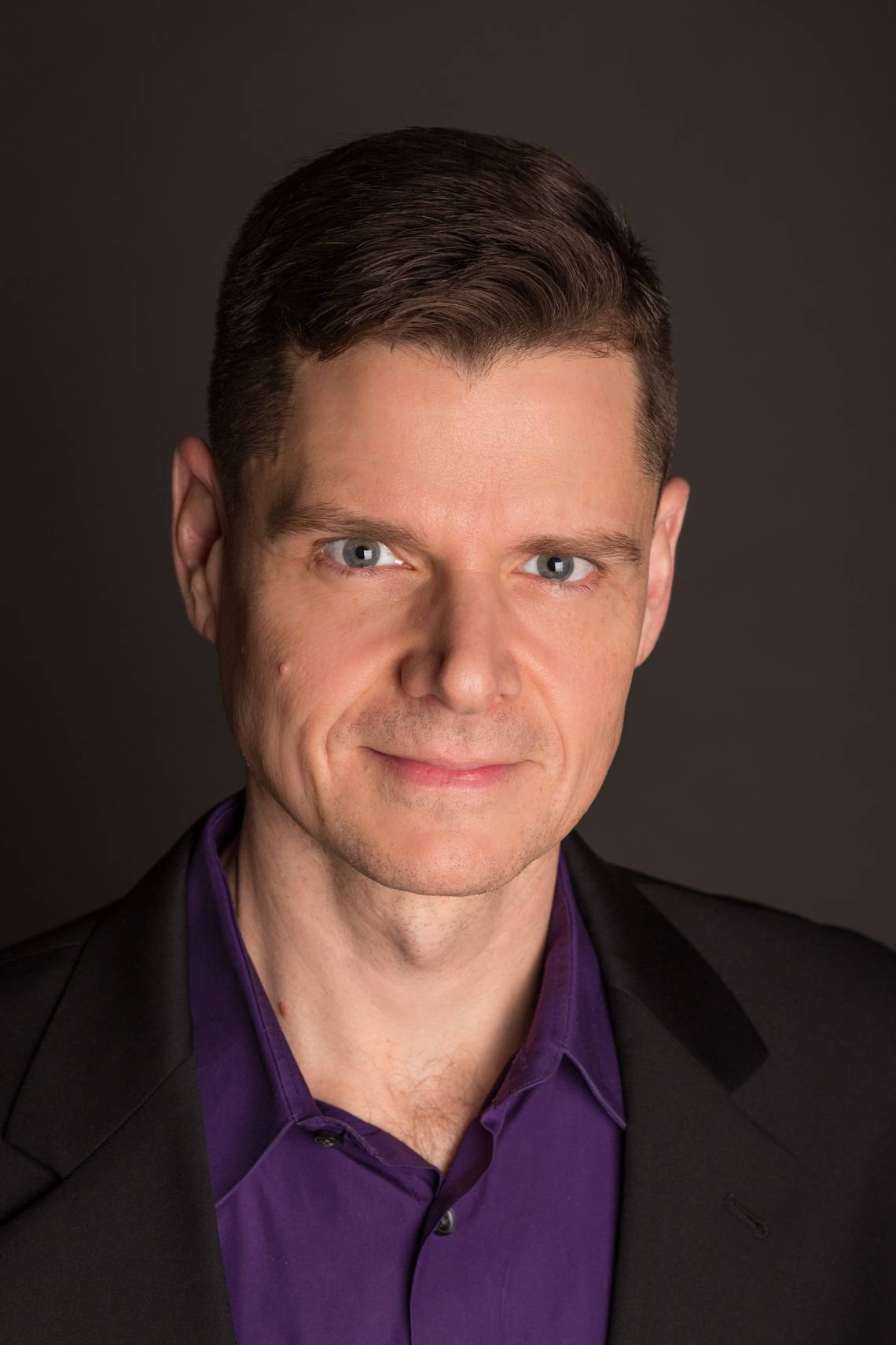Written By By Courtney Devores, Arts Correspondent for The Charlotte Observer
Shelby’s Rob Harrelson has been singing professionally for over 20 years, but he’ll be a newbie when he takes the stage in Opera Carolina’s production of “Macbeth” this fall.
A tall, slim bass-baritone with close cropped dark hair and striking blue eyes, Harrelson takes on two roles in one of Shakespeare’s darker tales — an assassin sent to kill Banquo (“definitely not type-casting” noted Maestro James Meena) and a doctor who witnesses Lady Macbeth unravel during the infamous sleepwalking scene.
Last year, he and his wife, Amy, returned to the area to be near family after two decades in Washington, D.C. There, he was a member of the Air Force’s Singing Sergeants — one of the military’s musical units, which include big band, ceremonial brass, strings, concert and rock bands.
The idea of changing careers in your 40s isn’t a new phenomenon, but it’s more common in the military, where you can retire after 20 years of service. But even in the Singing Sergeants, few aspire to become full-time opera singers.
If they do, they establish themselves earlier.
“Most of the time people do one term, and then they get out,” Harrelson explained. “I have friends that did that who are now in the Metropolitan Opera Chorus and that are out there doing opera full-time. As a bass-baritone, I’m actually a perfect age for most of the roles I would be playing.
“But most people my age have been doing it for 20 years, and they’ve got a track record. If (an opera company) is looking to cast a certain role, my name isn’t going to pop up at this point.”

Typically young artists’ programs that help musicians transition from school to the professional world serve younger vocalists.
“That’s what makes trying to be a solo opera singer challenging at this point. Most developmental programs typically go to age 35. It’s challenging to be heard,” he said. “There are definitely more direct paths when you start younger.”
But that hasn’t hindered Harrelson.
“I’m pleased with the amount of progress I’ve made since last fall. Being offered this chance in ‘Macbeth’ is a huge boost of confidence,” he said.
An unexpected career
Less than a year into his military retirement, he’s trained with Metropolitan Opera mezzo-soprano Victoria Livengood (also a North Carolina native), recently performed in “Don Giovanni” with the North Carolina Summer Opera Series and joined the Opera Carolina and Charlotte Master Chorale choruses.
“He brings a lot to the table,” said Emily Jarrell Urbanek, Opera Carolina’s director of music preparation and chorus master. “Great natural instrument, good vocal technique, a high level of musicianship, a spirit of collaboration, consistency, punctuality, reliability — pretty much everything you want in a company member.”
Growing up in Boiling Springs, Harrelson hadn’t planned on a career in music.
“I grew up in the Baptist church, and they have you in a choir as soon as you can stand. Half of the Singing Sergeants had been Baptists. My family is very musical but had a Jeffersonian philosophy toward music: It should be something you enjoy, but not something you do for a living,” he recalled.
He studied biology and history at Gardner-Webb, where his father worked as a biology professor. There, he was involved in band and concert choir.
“One of my voice instructors early on said, ‘If you look at an audience, and you know most of the people, you’re not making it,’ ” he said.
‘It’s the challenge’
Harrelson got his first real taste of opera and performing for strangers while at the University of Virginia in Charlottesville, Va. “I was working as a data entry guy, and I auditioned to be in the chorus at Ash Lawn Opera (now Charlottesville Opera). They offered me a role. People I didn’t know were wanting to hear me sing.”
He’d done community theater and sang along to showtunes in the car with his mom as far back as he could remember, but opera was something new.
“I’d been singing since I was 3 years old, and I’d never thought about doing the whole classical thing,” he said.
What hooked him then is what he looks forward to now.
“It’s the challenge. The whole notion of having to sing and act at the same time, telling a story, but singing such without any amplification — being heard over an orchestra. I had always sung pretty loudly, but you really have to make some serious noise,” he said.
Harrelson went on to study voice at Indiana University. But academia took a backseat to fatherhood when the military offered him a chance to support his new family and sing.
“My first wife was expecting our daughter at the time. I was working and going to school full-time, and music was such a time-suck. I knew there was no time to be a dad. I had to drop out of Indiana, and I saw an ad that the Singing Sergeants were auditioning,” he said.
His daughter arrived early — four days before the audition in D.C., where he was hired on the spot. Boot camp was a breeze after the sleepless nights with a newborn.
And the job taught him versatility.
“The Singing Sergeants and Navy Sea Chanters require you to do everything. I was running the Singing Sergeants by the time I left, and it’s really hard to find people that have the vocal hygiene where you take care of yourself and can control and understand your instrument and sing classical, and then sing pop and be believable at it,” he explained.
Although Harrelson didn’t deploy, his Air Force schedule made it difficult to commit to opera on the side.

“It’s a 24/7 thing. About four years ago, I auditioned and was offered a couple operas with the Washington National Opera. There were only three conflicts out of 36 calls. It looked very doable to me and my supervisor,” he said.
But her supervisor didn’t agree. “It involved one performance with the concert band, and they wouldn’t let me out of it,” Harrelson said. “That was the reason I’d waited that long (to audition) because I didn’t want to get the reputation as a tease. If you give them two no’s in a row, you don’t get a third. I never want to burn a bridge.”
Age not a factor
That conscientiousness is serving him well at Opera Carolina, where he’s praised not only for performance and vocal skills, but all around work ethic.
“I’m sure his military discipline contributes to a lot of his assets. But he’s also benefited simply from performing regularly throughout his career and generally keeping himself in great vocal shape,” said Jarrell Urbanek, the opera company’s music preparation director. “He’s continued to study and to look for opportunities to perform since I met him. Singers who are just starting out should look to him as an example of how to achieve longevity.”
Harrelson, who helps his landscape surveyor wife in the field when not performing, found his time away actually helped his technique mature.
“Even though I was singing for 20 years, for about 13 of it I wasn’t getting back to my opera technique. Real opera singing and anything else really don’t live together well,” he explained. “Waiting to get back into to it until I was in my early 40s has helped me. Establishing a technique at this age has been beneficial to hopefully not sound like an old singer.”
While few, if any, career military singers have found post-retirement success in opera (fellow baritone Richard Stilwell’s Army Chorus stint in the ‘60s wasn’t as extensive), Harrelson has taken inspiration from other performers.
“I saw John Davidson in ‘Oklahoma’ in 1990, and he was not a young man. He was playing this 18-year-old cat,” he recalled. Davidson was in his late 40s at the time.
“I saw Debbie Reynolds doing high kicks in ‘The Unsinkable Molly Brown’ around 2000. Age isn’t a limiting factor. I am going to be willing and able to sing at a pro level for 15 to 20 years. My wife has got good ears. I’ve asked her to tell me if I start sounding old.
“Then it’s time to wrap it up.”
Hidden cool
We asked artists and arts administrators interviewed for the Fall Arts preview to talk about their favorite piece of Obvious Cool art in Charlotte and their favorite Hidden Cool art.

Hidden Cool art: “I greatly enjoy visiting the Good Earth Pottery studio in Forest City,” Rob Harrelson said. “They have a variety of artistic items and also teach pottery classes. It’s pretty much brand new.”
This story is part of
an Observer underwriting project with the Thrive Campaign for the Arts,
supporting arts journalism in Charlotte.
Read more here: https://www.charlotteobserver.com/entertainment/arts-culture/article233782067.html#storylink=cpy


